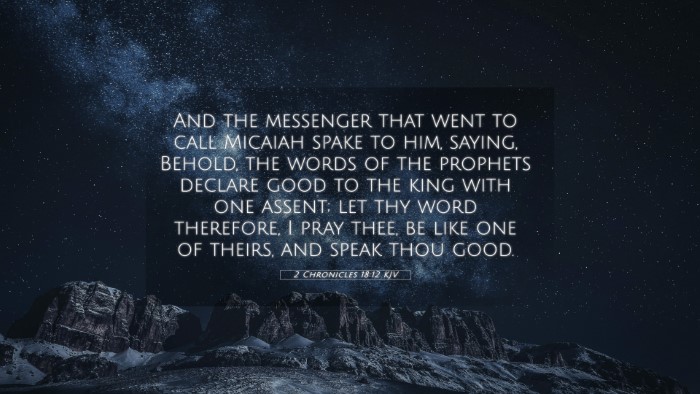Understanding 2 Chronicles 18:12
In 2 Chronicles 18:12, we encounter a key moment in the narrative surrounding King Ahab of Israel and the prophet Micaiah. The verse states, "And the messenger that went to call Micaiah spake to him, saying, Behold, the words of the prophets declare good unto the king with one assent: let thy word therefore, I pray thee, be like one of theirs, and speak thou good."
This verse highlights the pressure exerted on Micaiah, reflecting the larger theme of prophetic authority and truthfulness in the face of popular opinion. Public domain commentaries offer rich insights into the implications of this passage:
-
Matthew Henry:
Henry emphasizes the contrasting nature of Micaiah's impending message compared to the other prophets' enthusiastic yet false declarations. He argues that, regardless of external pressure to conform, true prophets must remain faithful to God’s word, illustrating the significant burden of representing divine truth in a corrupt environment.
-
Albert Barnes:
Barnes notes the strategic manipulation by the messenger, who encourages Micaiah to echo the sentiments of the majority. This represents a common human tendency to seek affirmation from those in authority, even at the cost of truth. Micaiah's refusal to conform serves as a reminder of the necessity for integrity amidst collective deception.
-
Adam Clarke:
Clarke provides a historical context, highlighting the significance of Micaiah’s role as a true prophet of Yahweh. His analysis focuses on the importance of discernment in prophetic voices, noting that while many spoke good things, Micaiah was called to reveal the harsh reality of Ahab’s fate, underscoring the critical nature of prophetic truth.
Global Themes:
The verse encapsulates several overarching themes found throughout scripture, such as:
-
Integrity in Faith: The pressure Micaiah faced is a common narrative throughout the Bible. Believers are often challenged to stand firm in their convictions, a theme echoed in 1 Kings 22:14 and Jeremiah 1:17.
-
The Role of Prophecy: Micaiah’s role speaks volumes about the responsibilities of those who speak on God's behalf. This is paralleled in Ezekiel 2:7 where the prophet is instructed to speak God's word irrespective of the people's response.
-
Truth vs. Popularity: As seen in this encounter, the challenge between truth and popularity resonates in Galatians 1:10, where Paul addresses the conflict between pleasing people and pleasing God.
Bible Cross-References:
- 1 Kings 22:6-16 - Ahab’s consultation with false prophets.
- Jeremiah 5:31 - Prophets prophesying falsely for popular approval.
- Ezekiel 2:3-7 - God’s charge to Ezekiel to speak His words regardless of the people's response.
- Matthew 7:15-20 - Jesus's warning against false prophets.
- 2 Timothy 4:3-4 - A warning of a time when people will not endure sound doctrine.
- Acts 20:29-30 - Paul warning of wolves arising from within the church.
- Romans 12:2 - Be not conformed to this world but transformed by the renewing of the mind.
Conclusion:
2 Chronicles 18:12 serves as a powerful reminder of the prophet's duty to convey God’s truth boldly, despite societal pressures. The study of this verse through Bible verse cross-references allows us to uncover a rich tapestry of biblical principles related to integrity, the prophetic ministry, and the eternal struggle between truth and popular opinion. For those seeking to deepen their understanding of scripture, utilizing a Bible concordance and exploring tools for Bible cross-referencing will enhance the ability to navigate the interconnectedness of biblical themes.











